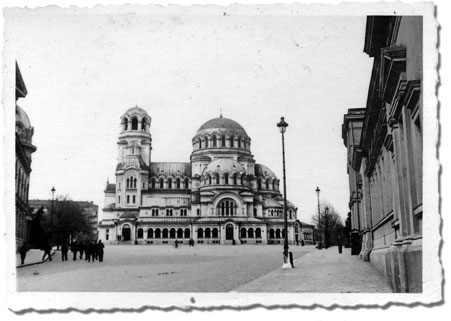Back again eight months later. In the intervening months we have been collecting Bulgaria related material – films, objects and photographs including a snapshot of the cathedral made by a German soldier during WWII.

Bulgaria is now officially part of the European Union. B and her father meet us at the airport and drive us to the hotel. L and I both have the feeling this is going to be a completely different kind of trip to the previous one because we will have two bases, Velingrad and Kazanlak from which to work. When we go into the streets late in the afternoon after a cloudburst there are puddles everywhere. |
|
We are already on a first-name basis with some of them from our last visit. Walking in the general direction of the cathedral and the flea market we are soon immersed in techno music which collapses in on itself after an assault carried out by an alliance of heavy metal and Cuban rhythms advancing from two different directions. Dancing in the street. Beers and sundry bottles being passed around in a general atmosphere of best-clothes revelry. All the eighteen year-olds are celebrating their final school examinations. Car doors open, the power going through the stereo system is pushing the speakers towards sonic epilepsy, the scene speaks of a recently-acquired, young, urban prosperity. It would be interesting to know if that wealth would have been displayed in the same way twenty or thirty years ago.
Back in the hotel L surfs and I disappear into the heart of Agatha Christie’s The Secret of Chimneys. It is quite as amazing as Todorova described it. Pure Balkanism: ‘It’s one of the Balkan States, isn’t it? Principle rivers, unknown. Principle mountains, also unknown but fairly numerous. Capital, Ekarest. Population, chiefly brigands. Hobby, assassinating kings and having revolutions.’ The imaginary country being described, Herzoslovakia, has been a republic for a while but ‘they’ve assassinated a president or two since then, just to keep their hand in.’
The entire book feels as if it has been doused in the condescension of imperial racism of that period (1920’s) and, even though the political history of Bulgaria is turbulent and includes a number of presidential and prime ministerial assassinations, it feels as if it has been put together relying on newspaper reports which were only made with very special interest spectacles on. Just as we almost only ever hear about Africa in the context of reports of war, drought and disaster. |